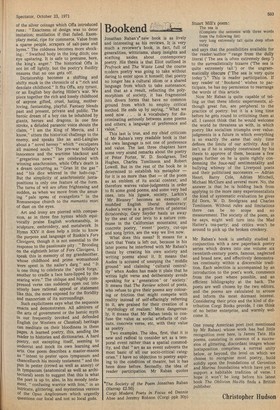Bookend
Jonathan Raban's* new book is as lively and interesting as his reviews. It is very much a reviewer's book, in fact, full of generalities, witticisms, sharp insights and scathing asides about contemporary poetry. His thesis is that Eliot outlined in Pruf rock and The Waste Land the course modern poetry was going to take without daring to enter upon it himself; that poetry no longer has a cultural idiom or a shared language from which to take sustenance; and that as a result, reflecting the polymorphism of society, it has fragmented into divers forms that have no common ground from which to employ critical method. He ends up by saying, "What we need now . . . is a 'vocabulary for discriminating seriously between some poems and others; a language of preference and value."
This last is true, and my chief criticism of Mr Raban's very readable book is that his own language is not one of preference and value. The last three chapters have some very sound remarks about the poetry of Peter Porter, W. D. Snodgrass, Ted Hughes, Charles Tomlinson and Robert Lowell. But in the rest of the book he is determined to establish his metaphor — for it is no more than that — of the poem as an emblem of its social context; and therefore waives value-judgments in order to fit some good poems, and some very bad ones, into his jigsaw, society. Larkin's 'Mr Bleaney ' becomes an example of muddled English liberal democracy; Auden's verse is a gentle form of paternal dictatorship; Gary Snyder hauls us away by the seat of our levis to a nature commune in the Californian mountains; and concrete poetry, ' event ' poetry, cut-ups and song lyrics, are the way we live now.
What does this mean? It means for a start that Yeats is left out, because in his later poems he interfered with Mr Raban's thesis by creating his own society and writing poems about it. It means that Auden is accused of usurping the 'middle ground' and claiming cultural centrality' when Auden has made it plain that he writes light verse and deliberately avoids speaking for a ' generation ' or 'society.' It means that The Review school of poets, who refuse to give their poems any colouring or friction that might compete with reality instead of self-effacingly referring to it, are praised for their creation of a 'mythology of realism.' More dangerously, it means that Mr Raban tends to confuse the value as social artefacts of cutouts, concrete verse, etc, with their value as poetry.
Two examples. The idea, first, that it is new and radical to consider art as a temporal event rather than a spatial commodity, and that "art as an event subverts the Most basic of all our socio-critical categories." I have no objection to poetry aspiring to the condition of theatre, but it has been done before. Secondly, the idea of reader participation. Mr Raban quotes
(Complete the sentence with three words from the following list) very long extremely tall quite deep often today
and says that the possibilities available for the reader/author "range from the dully literal (' The sea is often extremely deep ') to the surrealistically bizarre (The sea is quite extremely tall ') or the ungrammatically obscure (' The sea is very quite today ')." This is reader participation. If any reader of ' Bookend ' wishes to participate, he has my permission to rearrange the words of this article.
Now Mr Raban is quite capable of telling us that these idiotic experiments, although great fun, are peripheral to the practice of poetry: but it is a long time before he gets round to criticising them at all. I cannot think that he would welcome the world he threatens us with, in which poetry like socialism triumphs over valuejudgments in a future in which everything is so exactly the same that only time defines the limits of our activity. And it isn't as if he is simply constrained by his thesis to approve of them, because a few pages further on he is quite rightly condemning the faux-naif sentimentality and bullying whimsy of the Liverpool poets and their politicised successors — Adrian Henri, Barry Cole, Adrian Mitchell, Michael McClure and several more. No, the answer is that he is holding back from applying to the more zany experimentalists the kind of systematic evaluation he gives Ed Dorn, W. D. Snodgrass and Charles Tomlinson. Without rules and limitations there can be no scope and no measurement. The society of the poem, as he says, might well turn into the Mad Hatter's tea-party; and critics won't be around to pick up the broken crockery.
Mr Raban's book is usefully studied in conjunction with a new paperback poetry series which draws into one volume six twentieth-century poets, famous, neglected and brand new, and 'effectively demonstrates continuity within a discernible tradition. Each selection is accompanied by an introduction to the poet's work, comments from the poet where possible, and an efficient bibliography at the back. The poets are well chosen by the two editors, and the poems are calculated to arouse and inform the most dormant interest. Considering their price and the kind of distribution Corgi Books provide, I can think of no better enterprise, and warmly welcome it.
One young American poet (not mentioned by Mr Raban) whose work has had little recognition over here, is James Tate. His poems, consisting in essence of a succession of glittering, discordant images whose juxtaposition comprises a surreal unity below, or beyond, the level on which we choose to recognise most poetry, build solidly upon the foundations of Gerontion and Marina: foundations which have yet to support a habitable tradition of verse. I hope it won't be long before his latest book The Oblivion Ha-Ha finds a British publisher.
Christopher Hudson


































 Previous page
Previous page